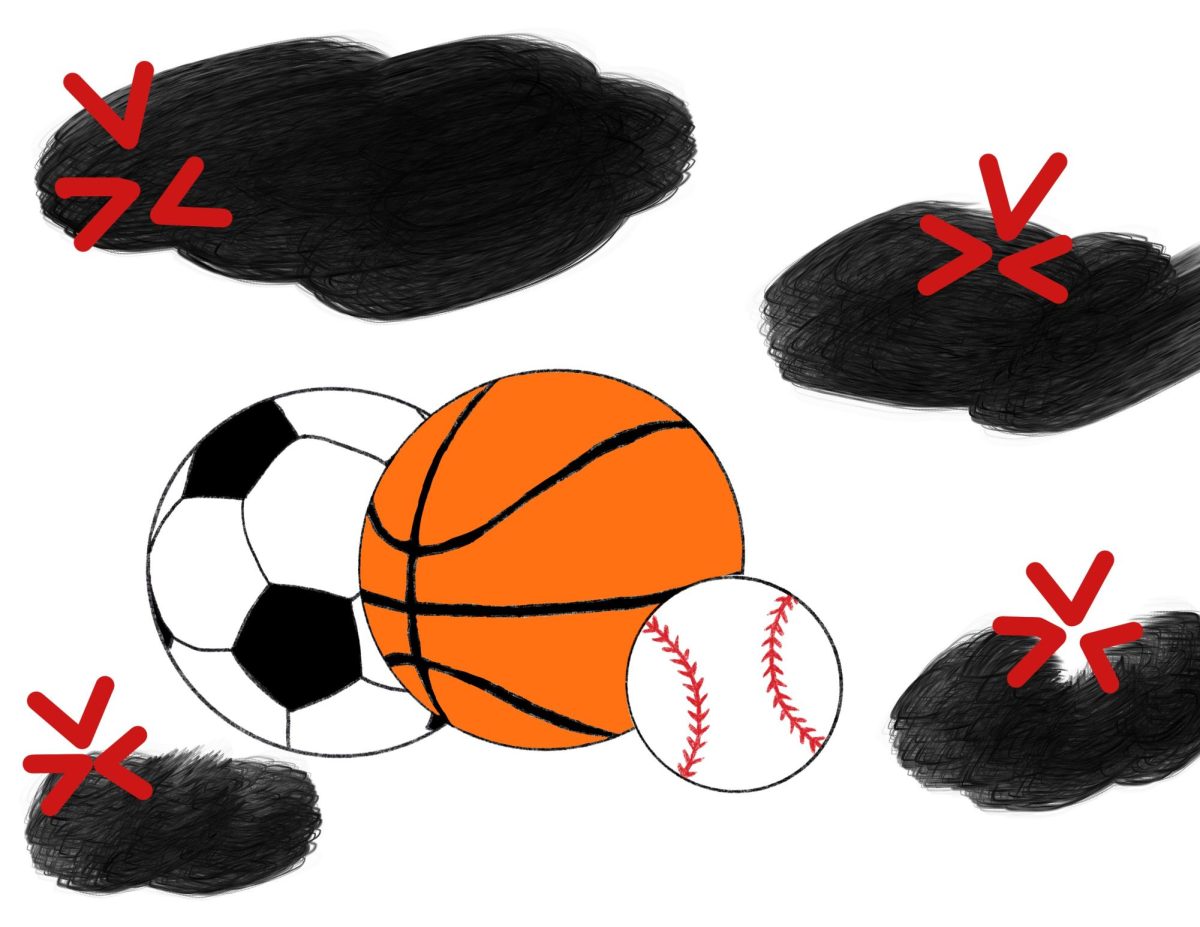A leap year, 2024 sat conspicuously on the calendar, promising new developments as we all hurdled across time. And new developments did it bring; with highs and lows all over the globe, from news to pop culture phenomena, the intricacies of this year and its most important happenings were nothing short of historical.
January emerged with a slow start for the world, aside from persistent conflicts that had spilled over from 2023. The world watched on as conflict in the Middle East and along the Russia-Ukraine border waged on. In Gaza, the Israel Defense Forces (IDF) codified the seize of the Gaza Strip, but the terrorist group Hamas continued to rebuild its units, leading to substantial casualties, according to the Gaza Health Ministry (moh.ps) with over 190 reported Palestinian deaths within 24 hours. Meanwhile, Ukraine continued to suffer civilian casualties, with the Russia-Ukraine War raging on since the immediate revival of the conflict in 2022. However, the United States continued to fulfill its promise of supplying Ukraine with military aid, delivering rockets, weapons, and armored vehicles in mid-January.
Conflict in Ukraine did not halt as January melted into February. Aleksey Navalny, Russian activist and a critic of Russian President Vladimir Putin, died in prison at age 47, prompting further speculation regarding the intricacies of the conflict. Yet February was also a monumental month for music, with Taylor Swift winning her fourth Grammy Award for her album Midnights (2023), which was declared Album of the Year. Swift’s Eras Tour continued its run, ultimately grossing over $2 billion; Swift herself amassed a networth of over $1.6 billion.
March brought an onset of the pop-cultural phenomenon of weight-loss drugs, with the Food and Drug Administration (FDA) expanding the use of the drug Wegovy to be the first weight-loss drug approved for reducing the risk of cardiovascular events in adults who are either obese or overweight. This was set against the backdrop of two converging issues: the fact that heart disease continues to be one of the leading causes of death in the U.S. – the cause of death of 20.1% of all deaths in the country, according to the Centers for Disease Control and Prevention (CDC) – and prompting the dialectical on weight loss in pop-culture. Secondly, a container ship collided with the Francis Scott Key Bridge in Baltimore, causing it to collapse and kill six people, an unexpected accident that surprised the nation due the fact that the ship had been operating without power or GPS for over three months. Wisped into the world of film, Christopher Nolan’s Oppenheimer was the biggest winner at the Academy Awards, winning seven Oscars, including one for Best Picture.
Eclipse glasses were on for April, with a total solar eclipse stunning parts of Mexico, the U.S., and Canada. Onlookers watched as the celestial phenomenon turned the sky grey – or completely pitch black, for a lucky few regions – witnessing North America’s second solar eclipse in seven years, and its last for another twenty years. Most kept their glasses on while looking at the phenomenon, though a select few believed there was no need. Across oceans, fighting spread in the Middle East, with Iran striking Israel with hundreds of missiles, designating a cease in the two countries coming into direct confrontation, and underlying the inherent greater conflicts in the region.
In May, Israeli forces moved into the city of Rafah, where a substantial portion of those on the Gaza Strip were being sheltered. This marked further escalation of the conflict, and caused the ideological protests (in the Middle East and beyond) to continue to swell. Staying in the region, Iran’s militant President Ebrahim Raisi died suddenly in a helicopter crash. Masoud Pezeshkian, a reform-centered politician, was elected to replace Raisi in July. On May 30, President Donald Trump was found guilty of 34 felony counts, and the first convicted criminal to be elected to office.
Dancing into June, pop musician Charli XCX released her album Brat on June 7, marking a popular swing into the distinctive style, text, and neon green color and energy of the album. Brat would continue to garner an identity of its own, codifying its identity with the arrival of “Brat Summer,” a distinct online presence and social media trend. “I heard a bunch of the songs [on] TikTok, so I feel like it’s going to be nostalgic of summer 2024 in the future,” expressed senior Carolina Villadiego. Even presidential candidate Kamala Harris added emblems of the album in an effort to appeal to younger Gen Z voters. Back in space, Boeing’s Starliner was launched, docking at the International Space Station, but soon encountering safety issues. This caused Boeing astronauts Suni Williams and Butch Wilmore to be unable to return on the capsule, and thus, stuck in space. Originally planning to only be on a week-long mission, the two hit six months in space this December. At the end of June, president Joe Biden and Donald Trump had their 2024 presidential debate. The performance of both candidates sparked controversy, and Biden’s performance would eventually play a role in his decision to leave the race in July.
The world flipped, skated, and ran into July, kicking off the 2024 Summer Olympic Games in Paris, which were held from July 26 to Aug. 11. France boasted its high technical plans of reducing the Games’s carbon footprint, not utilizing air conditioning as an environmental measure, and mandating that Olympic venues serve twice as many plant-based food options. New sports were also introduced, including skateboarding, sport climbing, and breakdancing, all of which garnered media attention.“I liked how, over the summer, despite all of the turmoil that was going on…the Olympics kind of brought everyone together for a while, which I found kind of soothing and necessary,” mused art teacher Tom Sena. “Particularly, I know for myself, I enjoyed the breakdancing,” Sena added. The U.S. came out on top, with 126 total medals, though tied for gold medals with China at 40. “It really united the community and caused us all to root for our country as a whole,” explained freshman Lily Cooper. Turning to the world of politics in the U.S., in Trump v. United States, the Supreme Court ruled that former presidents are entitled to absolute immunity from criminal prosecution. Less than a week later, now-elected and former president Donald Trump, survived an assassination attempt after a gunman opened fire during a campaign event in Pennsylvania. On July 21, incumbent President Joe Biden announced his withdrawal from the 2024 U.S. presidential election, endorsing incumbent Vice President Kamala Harris.
In August, Harris was officially certified as the Democratic presidential candidate in the 2024 race, becoming the first Black woman and first Asian American in U.S. history to win the presidential nomination of a major party. In the world of social media, Brazil banned the social media platform X (previously known as Twitter) due to suspicions of widespread information. Though the ban was eventually lifted in October, it prompted further discourse regarding media literacy, and whether nations have the responsibility to monitor media and information dissemination.
September brought economic shifts and natural disasters. On Sept. 18, the Federal Reserve cut federal funds by half a point – from 4.75% to 5% – in an effort to stimulate economic growth. Though this policy point may have seemed incremental, it marked a shift in policy from fighting inflation after the COVID pandemic to encouraging the flourishing of consumer and business dynamics. “From an artist’s standpoint, I think it was a little more difficult,” Sena remarked. “I didn’t sell as much, and I think that [was due to] the economy. I think a lot of people just weren’t as invested in art just for art’s sake; I think they were putting their discretionary funds other places, I know for myself and my family, food was a big expense this year, generally, what they call the ‘kitchen table issues,’” Sena continued. Meanwhile, Hurricane Helene landed in Florida, causing destruction and over 230 deaths in the greater region, and hitting repair costs up to $200 billion after traveling as far as North Carolina, according to the New York Post (nypost.com). This made it the most costly hurricane in American history.
In October, the U.S. went to space (again). Space Exploration Technologies Corp (SpaceX), an American space technology company owned by businessman Elon Musk, launched Starship, marking yet another feat in spaceflight development. Being the first fully reusable launch vehicle to ever take flight, it set the precedent for future promises of transports to the Moon, and even to Mars. Furthermore, it was a monumental month for North American politics, as Claudia Sheinbaum was sworn in as Mexico’s first female president. Artificial intelligence (AI) continued to be prevalent throughout the month of October, with ChatGPT garnering over 3,100,000,000 users in internet traffic, according to the virtual data collecting website Similarweb (similarweb.com). “I think the development of [AI] has been improving,” explained freshman Teresa Gerbi. “[It’ll] impact our classrooms, with students using it to ask questions,” Gerbi shared.
In November, the United States underwent its presidential election for the 47th president of the United States. According to Pew Research Center (pewresearch.org), across the polls, the most important issues for voters were the economy, illegal immigration, and foreign policy. On the Republican party’s ticket sat former U.S. President Donald Trump, along with his running mate, Senator J.D. Vance of Ohio, while the Democratic party held incumbent Vice President Kamala Harris and Governor Tim Walz of Minnesota. Ultimately, Trump won 312 electoral votes to Harris’s 226, a decisive victory. Furthermore, according to the Cook Political Report (cookpolitical.com), Trump won the national popular vote with a plurality of 49.83%. A monumental happening, this is the first time a Republican candidate has won the popular vote since George W. Bush in 2004. The election reflected an increasing degree of divisiveness between party lines, with specific policies and values becoming more and more endemic to specific parties. “It was very divisive, and [caused] a lot of hatred between friends,” said Cooper. “All the hatred led to a negative impact on the community, and all around,” Cooper reflected.
Finally, December arrived, rolling in with the winds of a possible La Niña weather pattern in 2025 (a wind phenomenon that could temporarily cool global temperatures, but not reverse the long-term warming trend the globe has continued to undergo). On Dec. 9, the European Union’s Copernicus Climate Change Service (C3S) confirmed that 2024 is now officially the hottest year on record, surpassing the previous record set in 2023. Data shows that global temperatures have now exceeded 1.5 degrees Celsius above pre-industrial levels (approximately from 1850 to 1900). But the month was not lost to climate calamities. Over December, winter weather progressively became colder, restoring a sense of normalcy to the season. Moreover, the ozone layer was announced to recover to 1980 levels by 2040, according to The Washington Post (washingtonpost.com). “I always have hope, I think, as an artist, you have to have hope,” Sena shared. “It’s important to bring light to things you want people to pay attention to, but I think if you have an impending sense of doom all the time it’s not healthy…it has to turn around.”

































